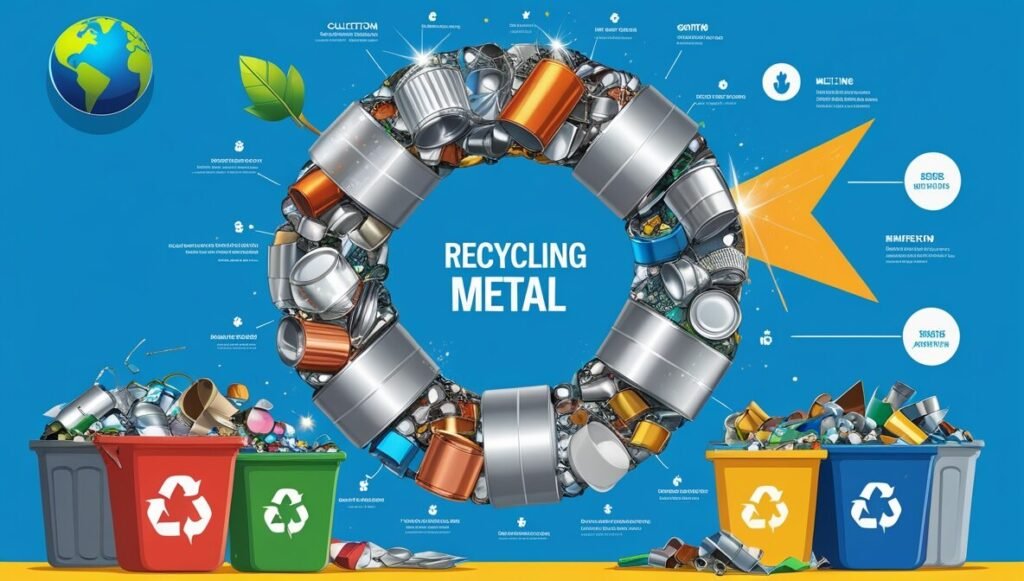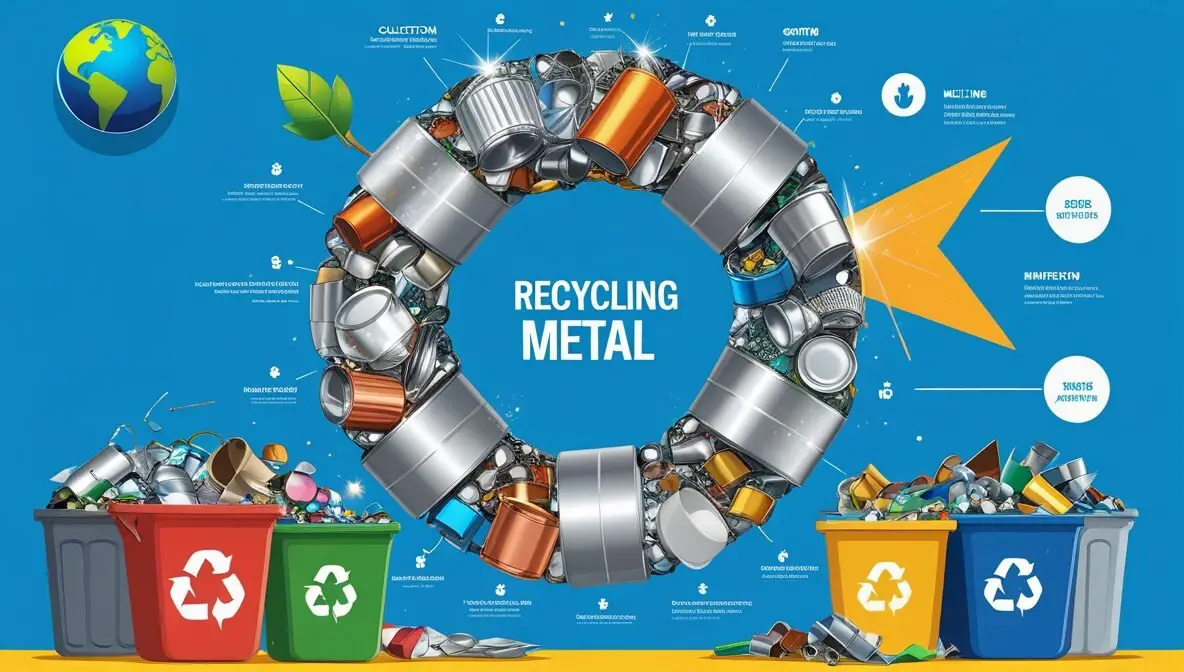Metal is everywhere in our lives. From canned drinks to household appliances and even our cars, metal forms the backbone of modern living. But when metal items outlive their usefulness, they often end up in landfills. This poses not just an environmental issue but also misses out on the significant value of recycling metal.
The process of metal recycling conserves energy, reduces pollution, and gives new life to materials that would otherwise be wasted. However, many people lack knowledge about metal recycling and its benefits or are uncertain where to begin. Whether you’re a homeowner, DIY enthusiast, or small business owner, this guide will help you understand how to recycle metal, prepare it for recycling, and find facilities near you.
We’ll take an in-depth look at metal types, recycling processes, local options, and step-by-step preparation. You’ll also learn about the environmental and economic benefits that make recycling metal such an important activity.

Why Recycle Metal? The Powerful Benefits
Environmental Impact
Recycling metal offers immense environmental advantages, including easing the strain on natural resources and lowering energy consumption.
- Energy Savings
Recycling metal is far more energy-efficient than mining and processing raw materials. Producing aluminum from recycled metals uses 95% less energy compared to mining bauxite. Likewise, recycled steel uses 75% less energy than creating new steel from iron ore. - Resource Conservation
Many common metals, including aluminum, copper, and steel, are finite resources. Recycling prevents over-mining and helps preserve these critical materials for future generations. - Reduced Pollution
Mining and refining metals release harmful pollutants into the air and water. Recycling avoids these processes and significantly reduces emissions. - Landfill Diversion
Metals don’t biodegrade. Recycling keeps bulky items like vehicle parts, roofing materials, and appliances out of landfills, freeing up space and preventing long-term environmental harm.
Economic Benefits
- Job Creation
The metal recycling industry creates jobs in collection, processing, and manufacturing, boosting local and national economies. - Monetary Value of Scrap Metal
Many metals, especially non-ferrous metals like copper and aluminum, have considerable monetary value. Selling scrap metal to a recycling facility can bring financial returns to individuals, businesses, and contractors. - Cost Savings for Manufacturers
Using recycled metal is cheaper than mining and processing virgin materials, making products more affordable for consumers overall.
Understanding Metal Types: Ferrous vs. Non-Ferrous
Before you start recycling, it’s important to understand the two main categories of metals and how they differ.
Ferrous Metals (Magnetic & Iron-Based)
- Characteristics:
Ferrous metals contain iron, making them magnetic. However, they are prone to rust if exposed to moisture for long periods. - Examples:
- Steel (cans, appliances, structural beams, car parts)
- Cast Iron (pipes, bathtubs, engine blocks)
- Wrought Iron (decorative gates, fences)
- Where to Find:
Common items for recycling include old cars, construction debris, and household appliances like refrigerators and washing machines.
Non-Ferrous Metals (Non-Magnetic & Valuable)
- Characteristics:
Non-ferrous metals are more corrosion-resistant, lightweight (like aluminum), and often more valuable than their ferrous counterparts. - Examples:
- Aluminum: Cans, window frames, foil, car parts
- Copper: Plumbing pipes, electrical wires, roofing materials
- Brass: Faucets, musical instruments, bathroom fixtures
- Stainless Steel: Kitchen appliances, cutlery, plumbing fixtures
- Precious Metals: Gold, silver, and platinum (limited to specialized recycling services)
- Where to Find:
Electrical wires, plumbing projects, beverage cans, and even e-waste are significant sources of non-ferrous metals.
Preparing Your Metal for Recycling
Proper preparation ensures your metal is accepted by recycling facilities and can even increase its value.
Cleanliness
- Rinse food residue from cans and aluminum foil.
- Make sure fluids are completely drained from containers, appliances, and car parts.
Separation
- Use a magnet to distinguish between ferrous (magnetic) and non-ferrous metals.
- Separate different types of non-ferrous metals to maximize their recycling value (e.g., copper wires vs. aluminum cans).
Remove Non-Metal Components
- Take off plastic handles, rubber fittings, or insulation from wires where possible. Removing these components ensures the metal is easier to process.
Safety First
- Use gloves to handle sharp edges.
- Be cautious with hazardous metals, such as lead batteries or items containing mercury. These may require specialized disposal methods.
Where to Recycle Metal
Curbside Recycling Programs
Your local curbside recycling program is a simple option for small metal items. Commonly accepted items include aluminum cans and steel/tin cans. However, larger items like appliances or car parts often aren’t allowed. Check with your local municipal recycling program for detailed guidelines.
Local Recycling Centers or Drop-Off Sites
Many local recycling centers accept a wider range of metals than curbside programs. These centers often take scrap metal like aluminum foil, copper plumbing, and even small appliances. Use online searches like “metal recycling near me” or “[your city/county] recycling center” to locate options near you.
Scrap Metal Yards
Scrap yards are the go-to facilities for recycling larger volumes of metal. They purchase metals by weight, with higher payouts for non-ferrous metals like copper and brass. Be sure to call ahead to confirm accepted materials and prices. Bring an ID, as many yards require documentation for transactions.
Appliance Recycling Programs
Retailers like Best Buy or Home Depot often offer appliance recycling services when delivering new items. Municipal recycling programs also sometimes take older refrigerators, dishwashers, or washing machines. Check these options before leaving appliances curbside.
Auto Salvage Yards
Auto recyclers specialize in dismantling vehicles, recycling their metal parts, and disposing of hazardous materials safely (e.g., oils and battery acid). Search online for “car recycling near me” to locate an auto salvage yard.
Electronics Recycling
E-waste (electronics like TVs, computers, and phones) contains valuable metals like copper, aluminum, and even gold. Find certified e-waste recycling centers for proper disposal of electronic devices.
What Happens to Recycled Metal?
Once collected, the process of metal recycling follows these steps:
- Collection & Sorting: Metals are grouped by type using magnets, eddy currents, or manual systems.
- Shredding & Baling: Sorted metal is shredded into smaller pieces or compressed into bales.
- Melting & Purification: Metals are melted at high temperatures, and impurities are removed.
- Solidification: The purified molten metal is cast into ingots, sheets, or recycled components.
- Reuse: These newly formed materials are sent to manufacturers to create new products, starting the cycle over again.
Conclusion
Recycling metal is an efficient, cost-effective way to reduce waste, conserve resources, and contribute to a more sustainable future. Whether you’re recycling a single can or dismantling a large appliance, each step you take plays a part in reducing environmental impact.
Take the first step today by sorting your recyclable metals and finding a recycling center near you. Together, we can create a circular economy where metal is reused indefinitely, helping to protect our environment and build a cleaner, greener future.
Can I recycle rusty metal?
Yes, rusty metals are still recyclable. The rust typically burns off during the smelting process.
Is recycling metal profitable?
Yes, especially with non-ferrous metals like copper and aluminum. Search for scrap yards to get a fair price for these materials.
Can aerosol cans be recycled?
Yes, as long as they’re empty. Always check local guidelines.
How do I recycle car batteries?
Lead-acid car batteries are best taken to auto parts retailers, repair shops, or specialized recycling centers.

Anamika is a passionate writer for Eco365Store.com, specializing in topics that inspire a cleaner, greener world. With expertise in home cleaning, recycling, and eco-friendly solutions, she crafts engaging and informative articles that help readers adopt sustainable practices in their daily lives.

